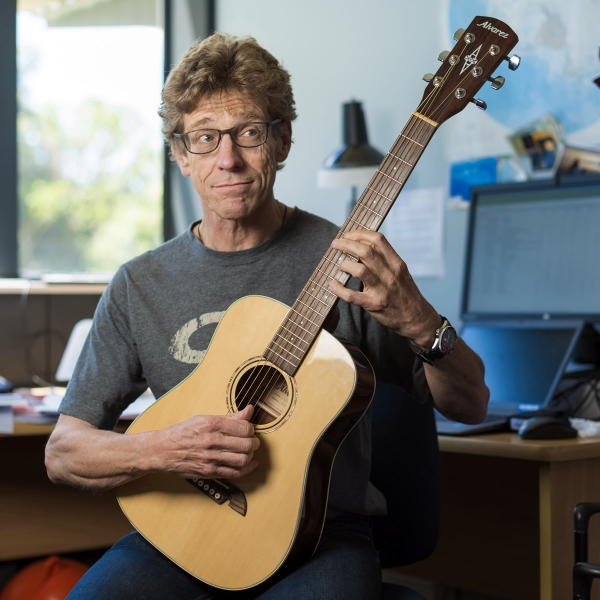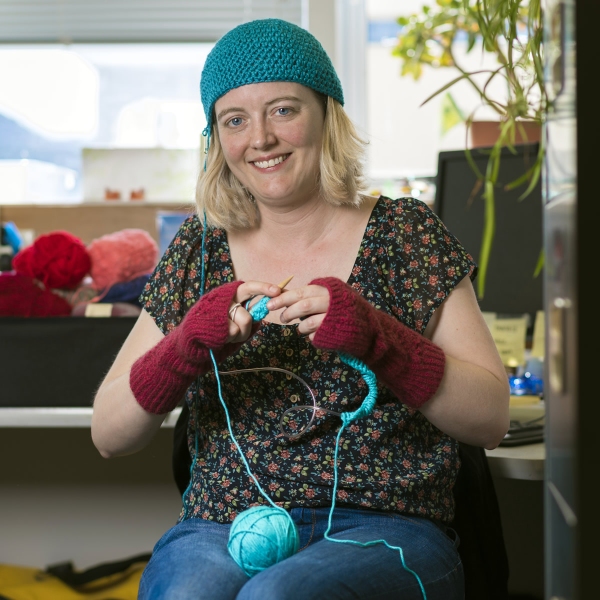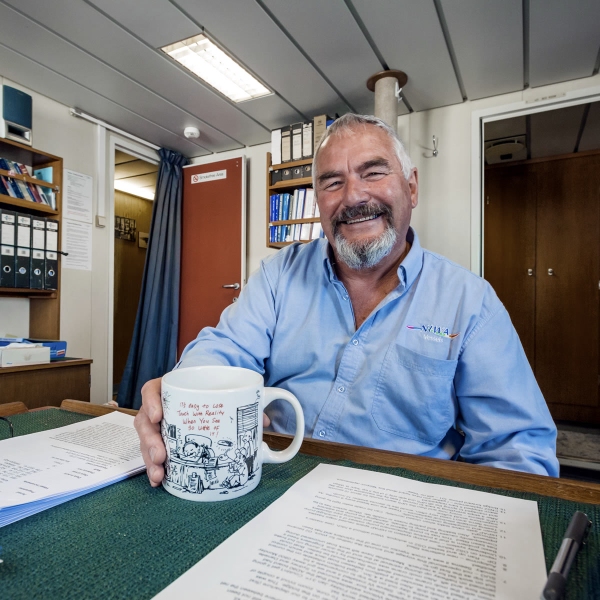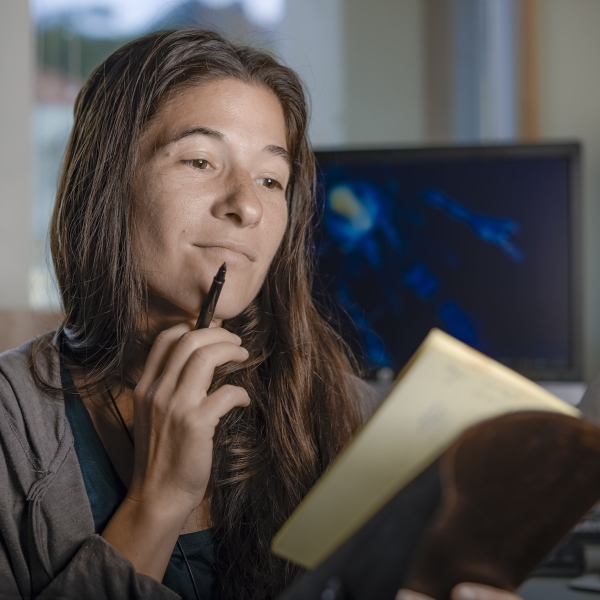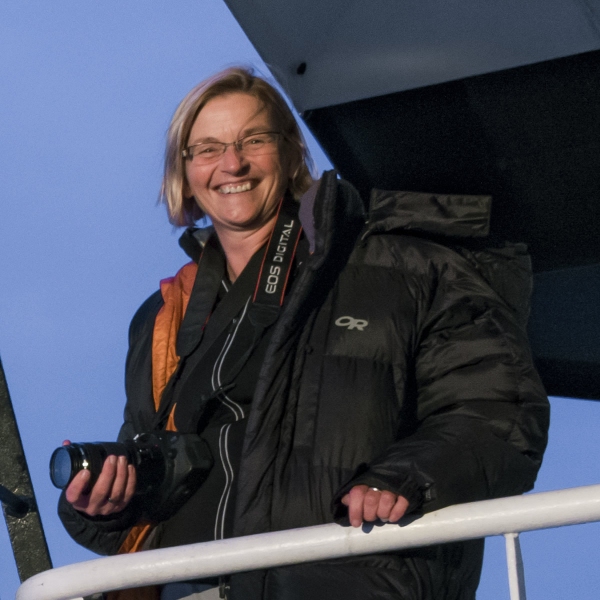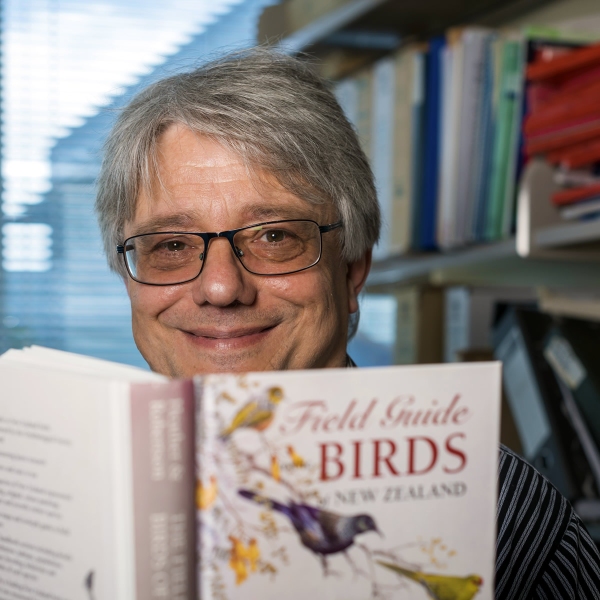NIWA’s research vessel Tangaroa sets off for a six-week voyage to Antarctica in February. Six of those aboard explain what they’re doing, what they’re worried about and the one thing they wouldn’t be without.
Dave Bowden
What’s your role?
I’m the voyage leader, which is primarily a logistics and co-ordination role. We have 10 research objectives on this voyage and my job is to make sure they all achieve what they need to and that there’s enough space and people on board to make that happens.
What are the challenges?
One of the biggest is allocating enough time for each project to gather enough data to achieve the research objectives. It’s a serious juggling act which needs a very efficient crystal ball. We want to squeeze in as much as possible but we know before we even get to Antarctica that the weather, ice conditions and sea state will be against us at some point.
How do you overcome those challenges?
We make a best-case scenario plan but know that at some point something will get dropped because of the weather. We don’t factor in too much contingency time but we are conservative with our estimates on how long it takes to get to places or deploy equipment.
What’s your biggest fear with the voyage?
I don’t really have any apart from general anxiety about doing the job well and leaving something behind on shore that’s important to us.
What will you take with you that isn’t science related?
My guitar. I’m not a great guitarist but I thoroughly enjoy it as a way to relax. You can collapse to your cabin after a watch and sit there for 10-15 minutes and play a few things.
Sadie Mills
What’s your role?
I am a marine biology technician and NIWA’s Invertebrate Collection manager so I am responsible for identifying benthic animals on our deep-towed imaging system (DTIS) camera, and leading the curation and preservation of any marine invertebrates that are collected. I am also responsible for chemical health and safety onboard, and completing the biosecurity import documentation for all of the samples we will be importing back into New Zealand.
What are the challenges?
The biggest challenge is making sure that all the samples we want to import back into New Zealand are properly documented, which means making sure all of our paperwork is in order. Every seawater filter paper and every sea star or crab that we collect must be properly accounted for before inspection when we come back into port
How do you overcome those challenges?
I make sure that all of the scientists onboard give me their sample lists as soon as we finish our work in the Ross Sea, and leave plenty of time to double check all the numbers on our long sailing back to New Zealand.
What’s your biggest or concern with the voyage?
My biggest fear is forgetting to pack something that I need to do the job. Once the ship leaves the port we aren’t going to turn around because someone forgot to pack a pair of scissors or their toothbrush!
What will you take with you that isn’t related to your job?
I will be taking some wool, knitting needles and a crochet hook. A friend gave me a book of patterns to make sea creatures out of wool a few years ago and I have never mastered the art of making them I would like to try and learn how to do that in my down-time.
Evan Solly
What's your role?
My role as Master of the Tangaroa is to ensure the safety of the ship, her personnel onboard including all voyagers, to protect the environment from the ship and protect the company's interest while maintaining full compliance with the mandatory maritime regulations and government legislation.
What are the challenges?
Given the previous response, help to ensure that the clients obtain a positive result in their scientific endeavours onboard.
How do you overcome those challenges?
By maintaining a positive rapport with the clients, good communication with respect for all involved and effective prior preparation.
What's your biggest concern with the voyage?
The unforgiving nature of the Antarctic environment and the remote location from assistance.
What will you take with you that isn't related to your job?
Music and light reading material.
Moira Decima
What's your role?
I'm in charge of the zooplankton sampling so that involves sampling for biomass, composition, and using DNA methods to look at the plankton food web. I'll also be taking measurements to look at the amount of carbon dioxide absorbed by the ocean.
What are the challenges?
Temperature will be a big challenge. I've never worked in sub-zero temperatures before and there are a lot of logistics you have to think about like chemicals freezing, nets potentially freezing and breaking, hosing down things and water freezing. Temperature also affects movements – I'm told you're much slower at doing everything. Another challenge is being away at sea for six weeks - it's a long time.
How do you overcome those challenges?
I'm anticipating there will be a lot of different things I will have to adapt to. Though I'm used to doing things in a certain way, if I see it's not working I'll need to stop and reassess.
What's your biggest concern with the voyage?
Too much ice so we can't get as close as we need to be to be able to sample well within the Ross Sea and the marine protected area. Also, I have a lot of logistical things to do before we leave and I'm concerned about getting those done in time.
What will you take with you that isn't related to your job?
My journal – I write it whenever I feel like it. There are times when it's densely packed and times when I don't write so much. I don't really document, it's more about how I feel, thoughts I might have.
Jenny Visser
What's your role?
I'm the voyage doctor, responsible for the health of everyone while they're on board. Everyone needs medical clearance before leaving and the chances of a serious emergency is remote. However, we have a hospital on board and while I've been on these kinds of voyages before, I'm busy reacquainting myself with everything that's there and working out what we need.
What are the challenges?
I suffer dreadful motion sickness for the first three days so need a bit of time to acclimatise. Medically, it's making sure you're prepared. I make sure I have contact details for specialists, including a dentist and ensuring you have the essential bit of equipment to increase someone's survival if needed.
How do you overcome those challenges?
These days it is far easier to communicate with someone back in New Zealand. It's a little less remote than it used to be and we could manage to send a photo or video to a specialist if we needed to. Otherwise, you have to do the best you can with what you have.
What's your biggest concern with the voyage?
The remoteness. No matter how much gear you have, you can't anticipate everything and I can't do it on my own. That's why we use time on the way down to do first aid training which is a good opportunity for the crew to train using the equipment. We come up with scenarios and practise those and I write protocols of what to do in different situations. We get the chef to save some pigskin and on the way back I hold a suturing workshop. That's always fun.
What will you take with you that isn't related to your job?
Lots and lots and lots of books and my camera. Also I've got a year's worth of unsorted photos on my laptop that I hope to get to.
Mike Harvey
What's your role?
I'm an atmospheric scientist leading a team of four taking atmospheric observations investigating the interactions between aerosols and cloud formation over the Southern Ocean. I'll be overseeing a range of instruments and testing methods.
What are the challenges?
It's a pretty challenging environment and I'm not anticipating that everything will work. We are hoping to characterise cloud properties in that region in situ. We have one or two bits of new kit, and some new ideas so we have to do some extra planning for those. We will also be flying a tethered helikite from the ship about 1000m up to measure aerosol profiles. This has only been done once before.
How do you overcome those challenges?
Part of the preparation is having back-ups or alternatives for things if something fails or doesn't work so all is not lost. We also need to ensure we have all the consumables we need, like helium and other gases for our instruments.
What's your biggest fear with the voyage?
I don't know if I really have a fear – I try to have relatively modest objectives although this time we're trying a lot of new stuff. We have to do it, that's the game - so I guess I'm concerned to make sure we have several ways of doing the same thing.
What will you take with you that isn't science related?
My bird field guide. I'm by no means an expert but I like observing them and seeing if I can identify them. Also, they'll be some books and a bit of music in my luggage.


